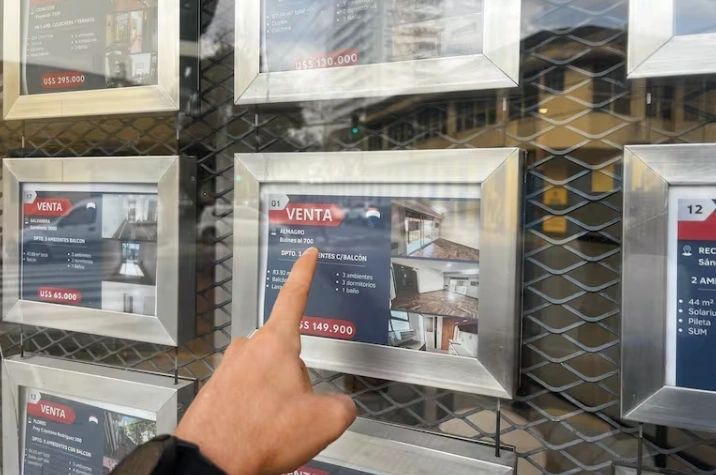BuySellBA
Administrator
The news that nobody wanted to hear about mortgage loans - La Nacion Propiedades
Source:
La noticia que nadie quería escuchar sobre los créditos hipotecarios
En medio de las preguntas que surgen en cuanto al futuro de los préstamos hipotecarios, un nuevo interrogante preocupa al sector
August 04, 2025
Amid questions about the future of mortgage lending, a new issue is worrying the sector.
By Candela Contreras

The Government regulated divisible mortgages, a new type of financing for purchasing properties in the pit. Shutterstock
In a country with more than three million households in need of housing and where mortgage loans represent just 0.2% of the Gross Domestic Product (GDP) , any new development that promises to unlock access to housing generates excitement.
And that's what happened with divisible mortgages : a new legal concept in Argentina that allows you to purchase a property off the ground with long-term financing , even before the property is built or subdivided.
The measure was published in the Official Gazette in mid-July through Resolution 2/2025. Divisible mortgages allow a developer to establish a general mortgage on a plot of land or project under construction, with each buyer then assuming their share of the loan as the work progresses .
The announcement was hailed not only by end consumers as an innovative step toward bringing Argentinians closer to the dream of owning a home from the early stages of real estate development, something that until now had been off the radar of the financial system; but also by developers as an incentive to encourage the purchase of projects under development .
But the bad news was not long in coming : the country's main banks have already announced that they will not offer loans under this modality , at least not in the short or medium term. "It's not on the agenda, we're not going to move forward," various entities assured LA NACION .
Despite the current legal framework, banking institutions believe the conditions for implementing this type of lending are not in place. This resistance once again highlights the mismatch between the policies developed by the State and the logic behind the operations of key players in the financial system.
Furthermore, one bank asserted that the regulations " can be implemented once the secondary mortgage market is established . That's what the financial system needs to be able to generate more credit."

Several banks have assured that they will not offer loans under this modality.Gonzalo Colini
What are divisible mortgages?
The tool allows a developer to establish a blanket mortgage on the entire project, and buyers can begin paying for their unit while it is being built. Once the project is completed and the units are subdivided, that mortgage is "divided," and each buyer assumes their individual debt with the bank for the specific property they purchased.In other words, as reported on the government's official website, the measure now allows " anyone to access a long-term loan to finance the purchase of a real estate development under construction (commonly known as a "pozo") or a lot in a neighborhood, even before the land is subdivided." They assure that the conditions will be the same as those of a completed property, thus facilitating access to housing from the early stages of a project.
Why won't banks offer them?
Despite the potential this measure could have for facilitating access to housing, banks are, for now, unwilling to launch lines under this format . The main reason? Banks lack the necessary funding to handle such a disbursement.But various analysts also agree that risk is an issue . "When purchasing a used unit, there's a finished apartment as collateral. Here, the real estate project can fail, and there are multiple parties involved in the process," warns housing economist Federico González Rouco. In other words, entities must rely not only on the buyer's solvency , but also on the project's viability and the developer's ability to execute .
Added to this are two structural obstacles: rising interest rates and a lack of liquidity in the financial system . In recent months, banks have begun to cut back on their mortgage lending. The average rate has risen four points since last year , making financing more expensive. And, as the sector explains, there is no room to continue lending for 20 or 30 years with deposits that mature every 30 or 60 days .

The average mortgage rate rose four points since last year.Daniel Basualdo
“Credit needs to overcome the pressure generated by the financial system's liquidity in order to lend long-term. We can't continue taking short-term deposits and lending long-term . There must be a capital market to support it, as is the case in countries where mortgage loans are the basis for access to housing,” González Rouco analyzes.
For his part, Issel Kiperszmid, president of the developer Dypsa, believes this tool is positive, but that it alone does not solve Argentina's housing shortage . "Macroeconomics is a necessary condition, but not sufficient. There must be credit at reasonable rates , and for that, banks must first be able to finance themselves. That's not the case today," he explains.
Even Eduardo Costantini, one of the leading figures in the Argentine real estate market, was categorical: " Mortgages will depend on the financial system's long-term funding, and that's not yet being seen . The macroeconomic situation needs to consolidate further. It's not something that happens overnight."
In other words, the tool was conceived as a legal incentive, but without any concrete commitment or interest from the banking system, which is ultimately the party that must grant the credit. For this reason, today it is more of a dream than a reality .
The importance of securitization in the mortgage market
Amid this debate, several banking associations (ABA, ABAPPRA, and ADEBA) came together to develop a proposal to make the mortgage market sustainable: moving toward a securitization model . As Santander Argentina stated in a recent statement, this model allows banks to issue loans and, once granted, share that responsibility with other investors through capital market instruments.This allows financial institutions to continue lending to more individuals and businesses , as they no longer need to maintain the entire loan on their balance sheets, giving them the liquidity they need to continue operating. This system, already in use in the United States, Europe, and many countries in the region, attracts institutional investors such as mutual funds, insurance companies, and pension funds, thus increasing the opportunities for more families to access housing.
"At Santander Argentina, we are supporting the market with mortgage loans, but with tools like securitization, we could scale more quickly and reach more families ," the bank explains. It's a solution that, according to the sector, could be key to developing structural solutions and addressing the country's social housing debt .
www.buysellba.com

